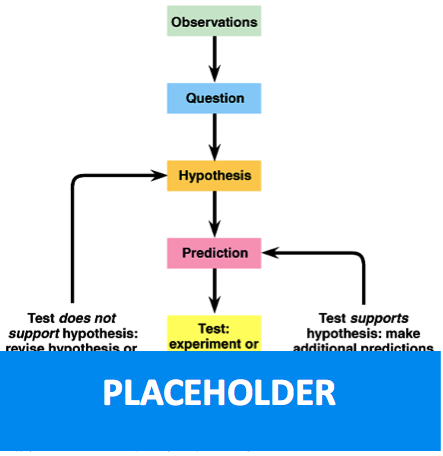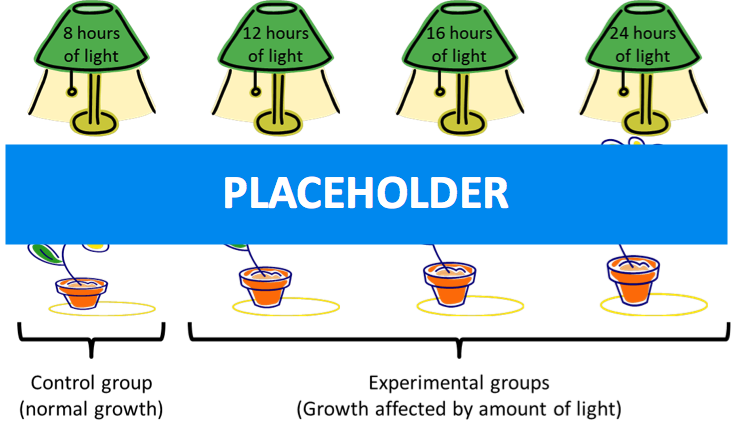Chapter 1. Scientific Method
Experimental Design
Welcome to Explore Biology: Interactive Online Labs. In this lab, we will explore various aspects of the biological sciences, including cell theory, genetics, energy processing, and evolution, among other topics. We will explore the world around us and inside us, and you will learn more about yourself than you ever thought possible.
Are you ready to begin?
Background Info

In order to learn the answer, the biologist first needs to develop a hypothesis. A hypothesis is a possible explanation for a previously observed phenomenon. In order for a hypothesis to be useful, it must be testable. This means that the hypothesis makes a prediction. Often this prediction can be phrased as an “If…then” type of statement. In this example, the biologist might hypothesize that longer days make the plant grow faster because the plant gets more sunlight. If more sunlight causes faster growth, then less sunlight should cause less growth. This is a testable statement with a yes/no answer. A variable is a factor or trait that changes in a predictable way when another condition changes. In this example, light and growth are both variables, and a change in one is predicted to cause a change in the other. The biologist can set up an experiment that will show whether this hypothesis is supported by quantitative data. This process of generating a hypothesis and testing it is called the scientific method.

- Ecosystems vary from mountain to rainforest to deciduous forest to grassland to desert.
- Over most of the continent, average temperature is higher than 20° C (68° F) year round. However, the mountains and grasslands can get significantly colder.
- Rainfall and humidity range from very high in the rainforests to very low in the deserts.
So, there are many potential conditions these insects could have lived in. What conditions are the best for specimen habitat and diet? That is what you are going to determine, using the scientific method.
Pre-lab Quiz
1.
Choose whether each of the following represents qualitative or quantitative data.
Weight of an animal in kilograms
Describing the behavior of chickens in response to different light levels
Height of a tree in meters
Patterns of flight in different species of butterflies
2.
Choose ALL of the following statements that represent testable scientific hypotheses.
If bees cannot see the color red, then they will not be attracted to red flowers.
If life exists on Earth, then there must be life on other planets.
If you eat all the right foods, then you can prevent getting all types of disease.
If birds use the stars to navigate when they migrate, then putting the birds in unfamiliar areas should affect their migration patterns.
If your DNA contains all your genetic information, then a person’s genes completely determine the type of life they will lead.
3.
Which is the independent variable?
4.
Which of the following describe the animal you will be studying today? Select multiple correct answers.
Bird
Insect
Has eight legs
Has wings
Is blue
Is able to control its body temperature internally
Experiment Notebook
In the space below, describe this new organism. Be as descriptive as possible:
In the next section, you are going to design and run your own experiment to test a hypothesis. To help you with this, you can choose from the various stimuli listed below:
| Hot water | Banana |
| Metal Paperclip | Shade |
| Cold water | Milk |
| Warm Oatmeal | Ammonia |
| Slice of Pear | Raw Pasta |
| Heat Lamp | Iodine |
| Cold Air | Ice |
| Cooked Macaroni | Meat |
| Hydrochloric Acid | Chopped nuts |
| Apple Juice | Paper |
What will you use as the control in your experiment?
Your three test substances and control substance are now available for you to use. Before you begin, though, record your predicted responses. If your hypothesis is true, what response do you expect to see from the animal? Record it in the table below.
| Predicted Response | |
|---|---|
| Meat | |
| Slice of Pear | |
| Banana | |
| Paper |
We will want to test these conditions at the same time to see how they interact. For example, 20oC might have a different effect on our organism in bright light than it would in low light.
Were the results you recorded in this experiment qualitative or quantitative data?
Brazil has a diverse array of habitats. Some of its ecosystems include:
Based on the results from this experiment, what do you think was the native environment for this organism?
| A. |
| B. |
| C. |
| D. |
Lab Report
To complete this section of the lab report, choose the correct response from the drop-down menus.
In the first experiment, the general traits and behaviors of this organism were determined. In the first round of testing, the organism seemed to respond well to but the had a negative effect. After testing all the starting substances, a new was created and tested. The organisms were exposed to different substances; this was the . The organisms’ responses to the substances were recorded; this was the .
In the second experiment, different combinations of temperature and light-level were tested to see which was the optimal environment for this organism. Temperature choices ranged from 10oC to oC, and the tested light levels were low, medium, and high. The data collected at each temperature/light combination seemed to indicate that the optimal environment seemed to be light and oC. Because of this, it was theorized that the organism’s native environment was a habitat.
In the final experiment, different diets were tested over a period of weeks. data averaged from different individuals for each diet indicated that the diet was best for this species. The data for this diet is shown in the graph below.
The data also indicated that was the worst diet for this species from those tested.
Results
Activity results are being submitted...